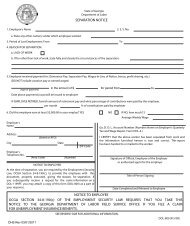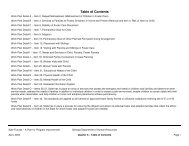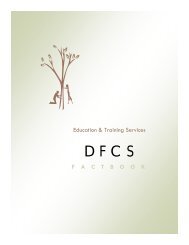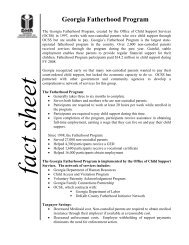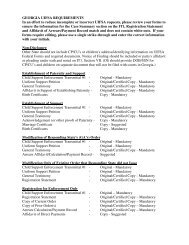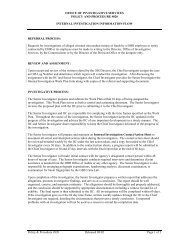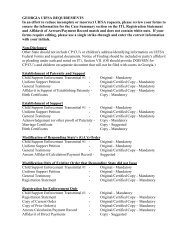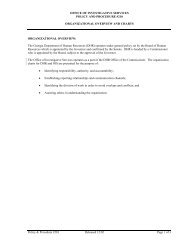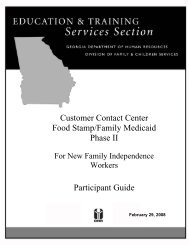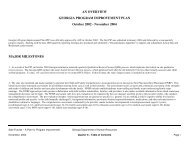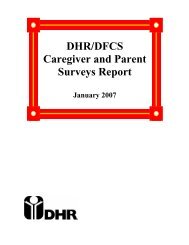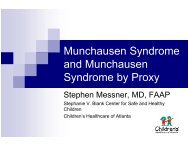- Page 1 and 2:
Table of Contents Work Plan Detail
- Page 3 and 4:
Work Plan Detail A -- Item 2, Repea
- Page 5 and 6:
3 rd Quarter Report: This benchmark
- Page 7 and 8:
This benchmark was achieved. A repo
- Page 9 and 10:
3 rd Quarter Report: This benchmark
- Page 11 and 12:
eing developed to outsource the tas
- Page 13 and 14:
Why is this partially completed. Ac
- Page 15 and 16:
Division more time to evaluate and
- Page 17 and 18:
Work Plan Detail B -- Item 3, Servi
- Page 19 and 20:
epresentatives. Draft policy develo
- Page 21 and 22:
support for additional staff who wi
- Page 23 and 24:
Data from these counties of the num
- Page 25 and 26:
B3 ACTION STEPS: Develop and provid
- Page 27 and 28:
Homestead. Develop a more thorough
- Page 29 and 30:
Work Plan Detail C -- Item 6, Stabi
- Page 31 and 32:
data provided by the Evaluating and
- Page 33 and 34:
ACCOMPLISHMENTS: 1st Quarter Report
- Page 35 and 36:
BARRIERS TO ACHIEVEMENT: C7 ACTION
- Page 37 and 38:
START DATE Oct. 2002 3rd Quarter: R
- Page 39 and 40:
1 st Quarter Report: The Work Group
- Page 41 and 42:
ACCOMPLISHMENTS: 1 st Quarter Repor
- Page 43 and 44:
Oct. 2003 Dec. 2003 3rd Linda Doste
- Page 45 and 46:
November 2003 to collect needed dat
- Page 47 and 48:
4 th Quarter Report: No report at t
- Page 49 and 50:
ACCOMPLISHMENTS: extension to Septe
- Page 51 and 52:
Work Plan Detail D - Item 7, Perman
- Page 53 and 54:
hardware difficulties. The Qualitat
- Page 55 and 56:
ACCOMPLISHMENTS: Achieved. Policy h
- Page 57 and 58:
Quarterly reports will be produced
- Page 59 and 60:
Further interviews reveal that whil
- Page 61 and 62:
and the State can determine why the
- Page 63 and 64: 1 st Quarter Report: The DFCS Infor
- Page 65 and 66: for 2002 and 2003? 4th Quarter Repo
- Page 67 and 68: Work Plan Detail E -- Item 9, Adopt
- Page 69 and 70: July 2003 June 2004 Field Directors
- Page 71 and 72: DOCUMENTATION PROVIDED 3rd Quarter:
- Page 73 and 74: BARRIERS TO ACHIEVEMENT: Current da
- Page 75 and 76: 4 th Quarter Federal Response: This
- Page 77 and 78: Goal achieved and ongoing. The lega
- Page 79 and 80: DATE DATE PERSON(S) BENCHMARKS June
- Page 81 and 82: Develop prototype of CPRS that incl
- Page 83 and 84: adoption checklist has been added f
- Page 85 and 86: CPRS. The State will explore traini
- Page 87 and 88: prepare a petition for termination
- Page 89 and 90: E17 ACTION STEPS: Develop a court o
- Page 91 and 92: This system allows for a double che
- Page 93 and 94: BARRIERS TO ACHIEVEMENT: E21 ACTION
- Page 95 and 96: BARRIERS TO ACHIEVEMENT: E23 ACTION
- Page 97 and 98: E24 ACTION STEPS: Convene group of
- Page 99 and 100: 5 th Quarter Report: Interview Repo
- Page 101 and 102: Refer to Office of Adoptions Policy
- Page 103 and 104: F2 ACTION STEPS: Revise new worker
- Page 105 and 106: BARRIERS TO ACHIEVEMENT: F3 ACTION
- Page 107 and 108: Work Plan Detail G -- Item 12, Plac
- Page 109 and 110: welfare policy, procedures and prac
- Page 111 and 112: R) office. This instrument is alrea
- Page 113: date -- Detail which show that staf
- Page 117 and 118: 4 th Quarter Federal Response: The
- Page 119 and 120: Work Plan Detail H -- Item 13, Visi
- Page 121 and 122: 2 nd Quarter Report: No Report due
- Page 123 and 124: their location. START DATE COMPLETI
- Page 125 and 126: H6 ACTION STEPS: Goal #3 Step 1: On
- Page 127 and 128: H7 ACTION STEPS: Goal #4 Step 1: Th
- Page 129 and 130: of community-based Family Visitatio
- Page 131 and 132: The Four Foster Care Consultants wi
- Page 133 and 134: I4 ACTION STEPS: Georgia will compl
- Page 135 and 136: Quarter: Requesting a start date ch
- Page 137 and 138: ACCOMPLISHMENTS: 1 st Quarter Respo
- Page 139 and 140: 3 rd Quarter Report: At this time,
- Page 141 and 142: 5th Quarter Report: Achieved. The C
- Page 143 and 144: I11 ACTION STEPS: Georgia will comp
- Page 145 and 146: DATE DATE PERSON(S) BENCHMARKS June
- Page 147 and 148: I14 ACTION STEPS: Examine policy an
- Page 149 and 150: I16 ACTION STEPS: Test whether need
- Page 151 and 152: BARRIERS TO ACHIEVEMENT: __________
- Page 153 and 154: implementation and the evaluation.
- Page 155 and 156: 5 th Quarter Report: Survey samplin
- Page 157 and 158: 1 st Quarter Report: Response as of
- Page 159 and 160: J6 ACTION STEPS: Family Group Confe
- Page 161 and 162: 3 rd Quarter Report/Georgia's Reply
- Page 163 and 164: 2 nd Quarter Federal Response: INDI
- Page 165 and 166:
3 rd Quarter Report: Partially Achi
- Page 167 and 168:
1 st Quarter Report: Partially achi
- Page 169 and 170:
DATE DATE PERSON(S) BENCHMARKS Apri
- Page 171 and 172:
___________________________________
- Page 173 and 174:
2 nd Quarter Federal Response: INDI
- Page 175 and 176:
2nd Quarter: Requesting a date chan
- Page 177 and 178:
are modeled after the Federal Quali
- Page 179 and 180:
ACCOMPLISHMENTS: 1 st Quarter Repor
- Page 181 and 182:
Work Plan Detail M -- Item 21, Educ
- Page 183 and 184:
___________________________________
- Page 185 and 186:
START DATE April 2002 children ente
- Page 187 and 188:
child this can be used to measure t
- Page 189 and 190:
to begin training, consulting, and
- Page 191 and 192:
5 th Quarter Report: The enhancemen
- Page 193 and 194:
2 nd Quarter Report: The four foste
- Page 195 and 196:
Division's implementation of the Wr
- Page 197 and 198:
to initiate the reviews. 5th Quarte
- Page 199 and 200:
5 th Quarter Report: Per Annual Eva
- Page 201 and 202:
3 rd Quarter Federal Response: The
- Page 203 and 204:
START DATE Nov. 2003 COMPLETION DAT
- Page 205 and 206:
5th Quarter: Per Houston, Linda Lad
- Page 207 and 208:
Work Plan Detail O -- Item 23, Ment
- Page 209 and 210:
DATE DATE PERSON(S) BENCHMARKS Mar.
- Page 211 and 212:
2 nd Quarter Federal Response: HOW
- Page 213 and 214:
The legal and HIPAA implications of
- Page 215 and 216:
Goal: The statewide multi-agency pr
- Page 217 and 218:
5th Quarter: Division Director, Soc
- Page 219 and 220:
United Way lists. ACCOMPLISHMENTS:
- Page 221 and 222:
Senior Vice President Community Ser
- Page 223 and 224:
The cost of maintenance and continu
- Page 225 and 226:
START DATE Mar. 2002 believes these
- Page 227 and 228:
2 nd Quarter Report: Achieved: Func
- Page 229 and 230:
Work Plan Detail P -- Item 24, Stat
- Page 231 and 232:
esolution and the correct policy in
- Page 233 and 234:
BARRIERS TO ACHIEVEMENT: Goal: Incr
- Page 235 and 236:
4 th Quarter Federal Response: This
- Page 237 and 238:
duplication. 4 th Quarter Federal R
- Page 239 and 240:
Work with vendor to develop project
- Page 241 and 242:
P11 ACTION STEPS: Work with vendor
- Page 243 and 244:
DATE DATE PERSON(S) BENCHMARKS Apri
- Page 245 and 246:
Actual approval received 12/02 (4 m
- Page 247 and 248:
ACCOMPLISHMENTS: Eliminated from SA
- Page 249 and 250:
Data /resources available/needed to
- Page 251 and 252:
SON for SACWIS Planning and IV&V in
- Page 253 and 254:
contract 10/02; Actual ACF planning
- Page 255 and 256:
4 th Quarter Report: ACF approval o
- Page 257 and 258:
BARRIERS TO ACHIEVEMENT: 4 th Quart
- Page 259 and 260:
P21 ACTION STEPS: Planning vendor k
- Page 261 and 262:
P25 ACTION STEPS: Receive proposals
- Page 263 and 264:
Work Plan Detail Q -- Items 35-37,
- Page 265 and 266:
BARRIERS TO ACHIEVEMENT: Q2 ACTION
- Page 267 and 268:
with particular emphasis on the cur
- Page 269 and 270:
5 th Quarter Report: Measurable Ben
- Page 271 and 272:
Substance Abuse and Family Function
- Page 273 and 274:
Work Plan Detail R - Item 42, The s
- Page 275 and 276:
ecommendations for change. A copy o
- Page 277 and 278:
BARRIERS TO ACHIEVEMENT: __________
- Page 279 and 280:
2 nd Quarter Report: 1. The Divisio
- Page 281 and 282:
1 st and 2 nd Quarter Reports: 1) A
- Page 283 and 284:
Dec. 2002 July 2003 GAHSC and non-m
- Page 285 and 286:
3 rd Quarter Report: Partially Comp
- Page 287 and 288:
5 th Quarter Report: Achieved: It h
- Page 289 and 290:
Placement Resource Development Unit
- Page 291 and 292:
Policy and FP/BP provider informati



